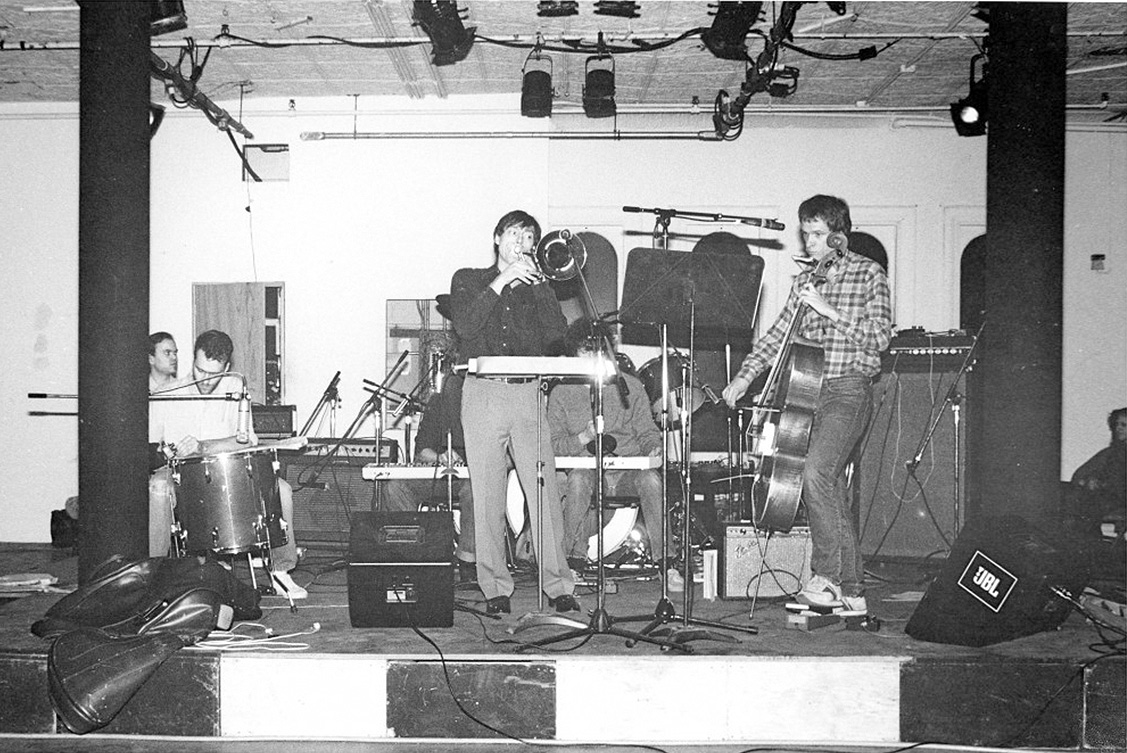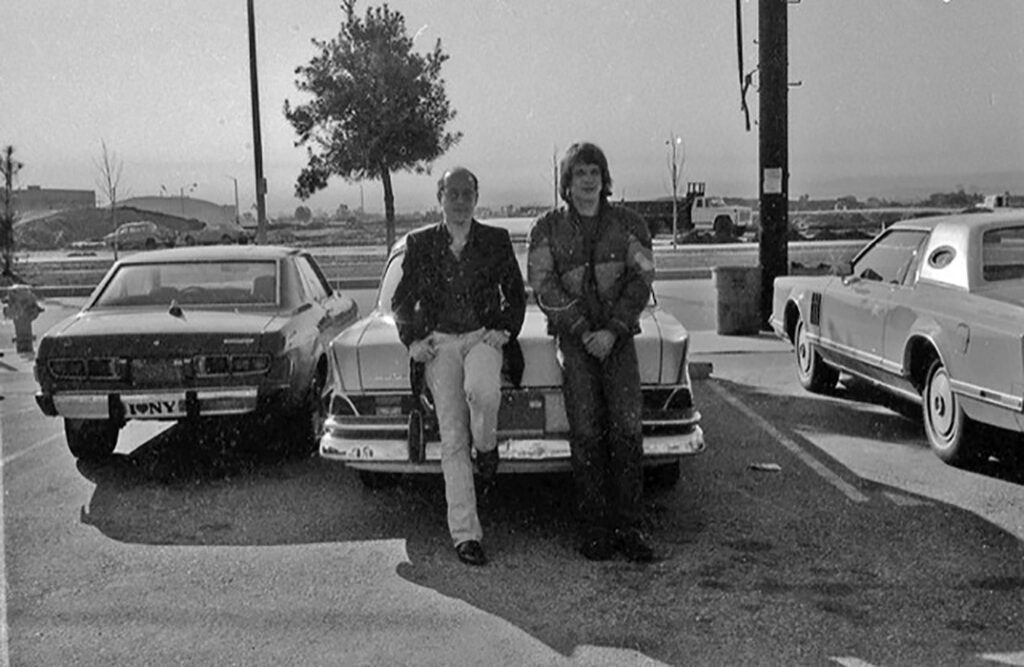When I met Peter Gordon, the composer and saxophonist was best known for his Love of Life Orchestra, a loose assemblage of musicians that took shape in downtown New York in the mid-1970s. Gordon had set out to create a ‘populist’ outfit where musicians and artists from various backgrounds could perform together. The result was a joyously raucous big band that trafficked in funk, minimalism, jazz, and rock, sometimes within the same song. Their music captured Downtown’s free-form aesthetic, and the group’s lineup included, at various points, many of the scene’s luminaries, such as percussionist David Van Tieghem, guitarists Rhys Chatham and Arto Lindsay, and writer Kathy Acker, to name a few.
Gordon was born in New York City, but he spent his childhood in Virginia, Munich, and Los Angeles, where, while in high school, he met Don Van Vliet (aka Captain Beefheart), who introduced him to the idea that music could be simultaneously raw and intelligent. He got his bachelor’s degree in the early seventies at the University of California, San Diego, under the tutelage of experimentalist Roger Reynolds. He earned his master’s at Mills College, where he studied with Terry Riley, one of the founding fathers of minimalism, and electronics pioneer Robert Ashley.
Gordon moved to the East Village in the 1970s. Since then, he’s collaborated with seemingly everyone in his orbit, working on projects with Laurie Anderson, video artist Kit Fitzgerald, and composing a score for the choreographers Bill T. Jones and Arnie Zane.
One of Gordon’s closest friends and collaborators is Arthur Russell, an avant-garde cellist, composer, and sometimes dance-club staple. Intense and whimsical, Russell defies categorization. He’s released all kinds of music under a variety of names (and on a variety of labels). Russell appears on several tracks by the Love of Life Orchestra, the most memorable of which is ‘That Hat’. On it, Russell’s delicate vocals hover over a skittering drum beat, punctuated by Gordon’s funky, squawkin’ saxophone. “Arthur said it was about a hat that focused the positive energy of the universe directly into one’s consciousness,” Gordon told me. The song appears on Gordon’s 1986 solo album, Innocent. He and Russell graced the WKCR-FM studio to discuss the release and how they met.
B. WENTZ Welcome Peter and Arthur to Afternoon Music. Peter, you’ve performed for years in New York with your own group, but this is your first solo record, correct?
PETER GORDON Yes.
B. WENTZ The album is called Innocent, and it’s being put out by CBS’s FM label. What does FM mean?
PETER GORDON Fucking Masterworks.
B. WENTZ You’re not supposed to say that on the radio! We hope no one from CBS is listening. The album includes music from a dance score you wrote called Secret Pastures.
PETER GORDON Yes, the premiere was done by Bill T. Jones and Arnie Zane a couple years ago at the Brooklyn Academy of Music. There are a few things from Secret Pastures, and there are a number of new pieces which were made specifically for the record. There’s also one cut, ‘Diamond Lane’, that I wrote in 1980 for a film directed by the conceptual artist Barbara Bloom. So the songs on the album cover a spectrum of work.
B. WENTZ Let’s listen to the track ‘The Day the Devil Comes to Getcha’. Who provides the rousing backing vocals on that song?
PETER GORDON That’s Clarence Fountain, Sam Butler, and some of the Blind Boys of Alabama. I worked on ‘The Day the Devil’ with Laurie Anderson, and we had been talking about incorporating a male chorus. Laurie had seen the Blind Boys perform in Lee Breuer’s musical The Gospel at Colonus, and she said let’s call them up. They’re great!
B. WENTZ About two dozen musicians appear on the record, including your frequent collaborator, pianist “Blue” Gene Tyranny. It seems many of them have also played with your Love of Life Orchestra, which you formed in the mid-1970s with percussionist David Van Tieghem. You’ve said the group is an attempt to create a ‘democratic music”’ that includes people from all sorts of backgrounds – classical music, rock, funk, poetry, visual art. That seems like a pretty good reflection of the city’s downtown scene.

PETER GORDON It’s been an evolution. I was born in New York, but I studied at the University of California in San Diego and then at Mills College. There are people who I work with now, such as [composer and musician] Ned Sublette, who I met in San Diego. Arthur was one of the first people I met when I came back to New York in 1975. So there’s a group of musicians who have been working together under their own auspices or in different configurations. I think what I’ve been doing in the Love of Life Orchestra is representative of that. I mean, Arthur might use the same group of musicians and call it the Arthur Russell Band, or [composer and trombonist] Peter Zummo might use a similar configuration. But the music is all different.
B. WENTZ Arthur is looking very remorseful in the back.
ARTHUR RUSSELL Looking what?
B. WENTZ Remorseful. Or, I should say, attentive. Arthur, you brought up a recording of your own, which you and Peter produced, correct?
ARTHUR RUSSELL Right, we had a chance to do something together in the studio. It’s called ‘Clean on Your Bean’. For the vocals, we wanted a bunch of guys doing raps. And these guys we found, they would do raps and they also had a tumbling troupe. So we were going to have a big circus of our own, and they came in and we did some raps, and we had several songs going on at once. But it turned out really good because [producer] François Kevorkian came in and remixed it and made it into a real rap record.
B. WENTZ So this is rap music by Arthur Russell, produced by you and Peter,
right? On your own label, Sleeping Bag Records.
ARTHUR RUSSELL By Dinosaur L. That’s the name of the group. It’s a 12-inch.
B. WENTZ A 12-inch by Dinosaur L. All these names!
ARTHUR RUSSELL Right, it’s like names of bands or names of poems, or names of songs or ideas. And you make up a new one each day, and you try to write them down, but you only get one chance a year to use one, sometimes two.
B. WENTZ The next recording we’re going to hear is something very rare that you brought with you.
ARTHUR RUSSELL I had a record that was on [Les Disques Du] Crépuscule called Instrumentals, which is maybe unavailable now. And they printed the wrong information on the cover. Well, the information was right, but they put the wrong tapes on the record and didn’t check the cover. So this is the right groove. The only time you get to hear it is right now.
B. WENTZ And this is recorded live at The Kitchen with Peter and who else?
ARTHUR RUSSELL Yes, April 27, 1975, with Peter Gordon, Ernie Brooks, Rhys Chatham, John Gibson, Garrett List, Andy Paley, me on cello, Jon Sholle, and Dave Van Tieghem on percussion.
There are so many versions of Instrumentals because the idea of Instrumentals is to have a core melody which has no form but which assumes a form gradually and that unites the stream of events of a group of musicians. Not unlike the Love of Life Orchestra. The melodies take on a visible form in the form of concerts. These concerts are recorded, in some cases, and that’s why they’re put on the record, and they’re different versions. But this is the first concert of Instrumentals, and it’s one of my favourites. The Kitchen has a great room sound.
PETER GORDON The recording is hard to find since Crépuscule is a Belgian label. So if you can’t find it, go to Belgium.
B. WENTZ How did the two of you meet in New York?
PETER GORDON I think we ran into each other at the St. Mark’s Poetry Project?
ARTHUR RUSSELL I think the first time I ever saw you was when [English experimental composer] Cornelius Cardew was answering questions after his concert. That’s when I talked to you for the first time.
PETER GORDON That was at The Kitchen, and you were music director of The Kitchen from 1974 to 1975.
ARTHUR RUSSELL Right.
PETER GORDON And that was the first time I was at The Kitchen. And it was a very cold day in January.
ARTHUR RUSSELL Yeah. It was a good concert, and you had some good things to say. I remember.
PETER GORDON I was probably obnoxious.
ARTHUR RUSSELL Yeah, you were leaning against the pole.
PETER GORDON I actually met David [Van Tieghem] through Arthur.
ARTHUR RUSSELL Yeah.
B. WENTZ The track ‘That Hat’ is one you both wrote together?
ARTHUR RUSSELL Yeah. I bought a hat just for the occasion.
B. WENTZ Oh. So the hat’s why you’re wearing the pointed hat? Is this the hat that inspired the piece?
ARTHUR RUSSELL No, the piece inspired this hat. I got it at a place on Atlantic Avenue in Brooklyn. That’s where they made the hat.
B. WENTZ Okay, so let’s listen to the extended version of Peter Gordon and Arthur Russell’s ‘That Hat’. Thank you guys for coming up.
Excerpted from Transfigured New York: Interviews with Experimental Artists and Musicians, 1980-1990 by Brooke Wentz. Copyright (c) 2023 Brooke Wentz. Used by arrangement with the Publisher. All rights reserved. Transfigured New York: Interviews with Experimental Artists and Musicians, 1980-1990 by Brooke Wentz is published by Columbia University Press


